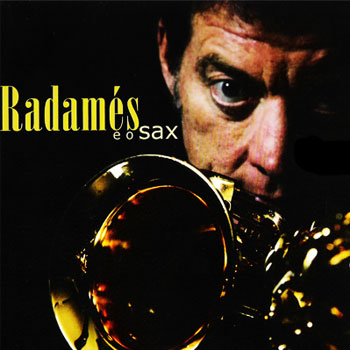Leo Gandelman - 1987

One of the most popular instrumentalists in the country recreates works by the maestro for wind, in his centenary year. The CD features Zélia Duncan.
Radamés Gnattali (Porto Alegre 1906/Rio 1988) was the great modernizer of Brazilian music in the 20th century. Classically trained, he was enchanted by choro in his youth and later turned to jazz for elements that would help him in his innovations. Along the way, he, who was a capital pianist, was looking for instruments suited to his renovating ideas. The saxophone was one of them and in collaboration with some of the instrument’s greats – Luis Americano, Zé Bodega, Sandoval Dias and Paulo Moura – the composer designed a modern language for the Brazilian sax.
“Radamés e o Sax” summarizes these experiences and its repertoire can be divided into three groups. The first is pieces for tenor sax created from Gnattali’s admiration for Zé Bodega (“Bate papo”) and Sandoval Dias (“Pé ante pé”, “Amigo Pedro”, “Brasiliana nº 7”). The former is considered the greatest Brazilian tenorist and Radamés portrayed a relaxed and bossa-filled way of playing. Sandoval, on the other hand, was criticized by his instrument colleagues for not caring about jazz, nor cultivating his accent. It was precisely for this reason that, in addition to a few choros, Gnattali dedicated the masterpiece “Brasiliana nº 7” to him.
The third group consists of choros composed to be played by sax section (Asim é Melhor, A fumo do meu cachimbo and Remexendo), in which the melody itself is structured to work well in this instrumentation. A delight! The exception of these groups is the unreleased samba song “Saudade de algo” with lyrics by the ace Paulo César Pinheiro, perfect space for the conversation of the warm timbres of the alto sax and the voice of Zélia Duncan. The group of musicians who participated in the album is the Novo Quinteto, a group that recreates the sound of the legendary Quinteto Radamés and is composed of musicians who have studied the style for years.
Summarizing decades of evolution of the Brazilian sax in a single work was only possible thanks to the passionate dedication with which Leo threw himself into this project. As an instrumentalist, he immersed himself in the style, rescued sounds and, without ever ceasing to be himself, walked through the heritage of legends of the instrument, completely at ease. From the soprano to the baritone sax, solo or in section, with the erudite rigor or the irresistible swing of the gafieiras, Leo Gandelman showed once again how good he is at sax, how good he is at music and how much he is Brazilian. – Henrique Cazes.
Repertoire: Bate Papo (Radamés Gnatalli), Assim é Melhor (Radamés Gnatalli), Serenata no Joá (Radamés Gnatalli), Variações Sobre um Tema de Viola (Radamés Gnatalli), Samba Canção (Radamés Gnatalli), Choro (Radamés Gnatalli), A Fumaça do Meu Cachimbo (Radamés Gnatalli), Pé ante Pé (Radamés Gnatalli), Missing Someone (Radamés Gnatalli – Paulo César Pinheiro) participation: Zélia Duncan, Remexendo (Radamés Gnatalli), Amigo Pedro (Radamés Gnatalli), Valsa Triste ( Radames Gnatalli).